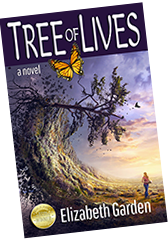A Therapist’s Perspective
by C. V. — Therapist, Adult Healing Center / Montpelier, France
Elizabeth Garden’s cathartic codex: “Tree of Lives” can open difficult wounds, but this book will also cleanse them; and help bring a troubled reader to the path of healing.
Garden’s book has been a great blessing to my Adult Healing Workshops in Montpelier, France, where I host private retreats for a set of international women and men who are survivors of childhood trauma.
Our Summer workshops involve three weeks at the center, split by ten days in nature (in the Pyrenees Mountains and on the Mediterranean Coast), which gives the guests/ patients ample time to read. “Tree of Lives” is in our library at the center, and before the “dix-jours en plein air” (ten days of fresh air), I give a little introduction to the book and see who wants to take a copy on the trip.
The beginning is a bit harrowing and can be a challenge for our guests/patients as hypersensitivity is common to abuse survivors. But usually on the second or third day, I notice a change come over the person reading this book…
Two-thirds of our guests/patients are professional women, and the rest are professional businessmen. Many of the women and men have important and demanding executive jobs at top companies. They come to our retreats because they know they can count on our non-judgmental attitude and complete discretion and confidentiality. Because telephones are not permitted – their cameras are a privacy threat – and because our clinic has a very strict “no social-media” policy, our guests/patients are exceptionally vulnerable staying with us. This is because much of their professional lives is about staying connected through technology. This vulnerability is one factor that aids the change “Tree of Lives” inspires.
A second factor is their heightened vulnerability caused by their unfamiliarity with exposing their true selves in the company of their peer-group; (after all, emotional and physical abuse in childhood can haunt the adult lives of high achievers more than it does other people; as lower-income workers are usually able to incorporate many of their unhealthy behavioral patterns, which they learned through abuse, into their lives with complete transparency, without it raising flags or signaling alarms among their personal and professional relations.
But high achievers feel obliged to conform to the elitist standards of politeness, and need to appear irreproachable, exposing none of the individual quirks that make us human and are endearing to members of the lower-classes; whereas in their class, such quirks are seen as flaws and can carry heavy penalties.
So, taking these vulnerabilities into account, a book with the power of an author’s first-hand experience dealing with trauma, and so beautifully written, has the power to provoke catharsis. As Elizabeth Garden is herself an abuse survivor, her words contains the necessary emotions and language patterns for what in psychology is called: “tertiary social sharing.”
While this book is capable of wetting the eyes of healthy adults, I have observed these serious professionals who are abuse-survivors while reading”Tree of Lives”; and I have seen them reach the second half of thebook… all of a sudden, these faces that are usually serious and hard as rock, melt completely and fall into tears. It is a very beautiful thing.
The problem with most reputable books written on abuse is their authors lack of first-hand experience; which, though it is unfortunate that Ms. Garden had to be a victim of childhood emotional and physical abuse, the rest of us are lucky for this; because, her pain is what gives her book its gift to cleanse.

